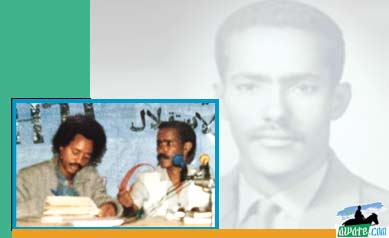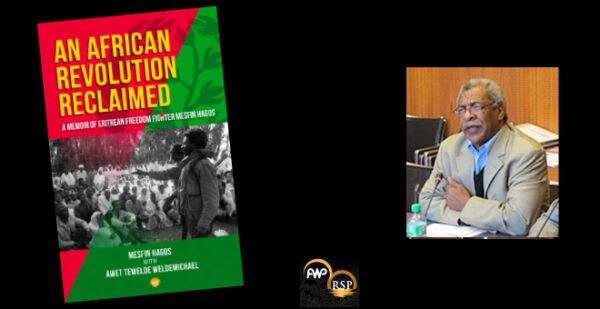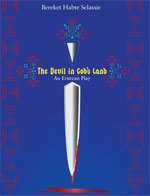Tesfay W. Degiga’s Eulogy for Ahmed Nasser

Tesfay W. Degiga’s Eulogy for Ahmed Nasser In Memorial Service held in Oakland, California, on April 6, 2014
(Translated from Tigrinya by Semere T Habtemariam)
When the news of the martyrdom of Tegadalay Ahmed Nasser was heard, Eritreans, from all the corners of the world, have found the news utterly shocking; we all have been closely following (how people have responded to the news). Indeed, how can we not mourn; how can we not grieve the loss of a freedom fighter who spent life-time struggling for national independence and to ensure the perpetual existence of a sovereign and democratic Eritrea and its development. Death will come to us all; it is our cruel fate, but Ahmed was taken away from us before seeing the Eritrea that had consumed his life’s dreams and aspirations; before setting his feet upon the land that was free from foreign occupiers; and without resting and taking shelter in his father’s and grand-father’s home.
On one hand, I stand before you representing the Eritrean Peoples’ Democratic Party, its leadership and membership to express our deepest sorrow and to demonstrate to Ahmed’s family and to the Eritrean National Salvation Front that we equally feel their loss; but, on the other hand, to bear testimony to the positive and personal experience I had, as a man, with martyr Ahmed Nasser in our struggle history.
I met Tegadalay Ahmed Nasser, for the first time, in June of 1973, when he was in charge of guiding me to assume my struggle duties. We just completed our military training and political education; and he was part of the Military Command which was elected to the leadership in the First National Congress. He had just returned as a commissioned officer from a military training in Iraq and was a member of ELF’s highest leadership. He was a young leader with clear vision, approachable, accessible and friendly, but most of all, was able to communicate with three languages: Tigrinya, Arabic and English. The presence of Ahmed amongst us, the new recruits, in the wild jungles of Eritrea, was a source of tremendous encouragement and the reason why we stayed on to do our part in the struggle. This I like to bear witness to.
In 1975 Martyr Ahmed was elected to be the chairman of the ELF and since I was elected the Secretary of the Executive Committee, our long journey continued replete with shared and common experiences. I don’t have enough time to tell the whole history, but, bear with me to highlight some of the vivid memories that couldn’t escape me and that I deem appropriate to this occasion.
It is no secret that Ahmed Nasser was a Tegadalay known for his patience, tolerance, equanimity, utter lack of totalitarian inkling and his proclivity for team-work and to encourage and motivate others. I couldn’t dare say that Ahmed had confronted all situations possible to man in his life, but he had most of them. As I go back in history and reminisce about the departed martyr, I can say that he had experienced the sweetest and bitterest things that life had to offer. He had met and dialogued with some of the most important international leaders such as that of the former Soviet Union, East Germany, Western Europe, most of Arab countries and the former US President Jimmy Carter. He had also consulted and dialogued with simple workers, peasants and with those rank and file Tegadelti who didn’t have any guarantee of whether they would have a decent meal the next day. Within a short time, he could have been aboard a plane or ship and traverse oceans and deserts; he had the freedom of movement. There was also a time when his freedom of movement was curtailed and had to be jailed in a small and narrow place surrounded by acacia trees and an army of prison guards watching him. In short, there was times when he was well dressed and poorly dressed; happy and sorrowful; drenched by rain and engulfed by sandstorms/dustbowls and sheltered from them; and contented and dissatisfied. There were also times where he was accommodated at the best hotels; and other times where he slept on rough surfaced ground using rocks and wood as a pillow. He spared nothing for the sake of Eritrea’s independence by walking on the good and the bad, the dry and wet and on the prickly and smooth grounds.
In 1986 the civil war came to an end and when the time came to start a new dialogue with the EPLF, he was the one who traveled to Sahel leading the Dialogue Committee. During this time, the then Assistant Secretary General of the EPLF, Isaias Afwerki, pointed out that they were suffering from a shortage of anti-aircraft weapons and asked us if there was anything we could do to help out. During the civil war, our weaponry was under the control of the Sudanese government but we had, by this time, regained possession of them. Our position at the time was, “Our presence has been severely weakened and we could not much use our heavy artillery. We should therefore support the EPLF and let them use them.” This does not mean there were no questions about the possibility of the EPLF using them against us. But, we took the decision that, “regardless of what kind of action will be taken against us in the future, we should not keep the heavy artillery in the storage; we should let the Peoples’ Army use them in their fight to rid the Eritrean people of colonization.” All the artillery in our possession such as the 36 mm Anti-aircraft machine gun was given to be used by the Peoples’ Army. Martyr Ahmed Nasser was the leader of this decision and its fervent defender.
After the liberation of Eritrea, we took the position that there should not be any power vacuum in Eritrea and towards this goal we put down the weapons we have had mounted on our shoulders against the enemy. Ethiopian rule in Eritrea must be replaced by Eritrean rule. It was natural for the Peoples’ Front that marched into our capital city to take over the rule of the country; and we accepted it as a transitional government; for the Eritrean people were spared double oppression. A congratulatory message (Glad that God had enabled you and us to see Eritrea’s liberation) from the ELF was sent to Asmera with Ahmed Nasser’s signature on it. Our good will and gesture was not limited to this: Martyr Ahmed Nasser was leading a delegation to Asmera for Dialogue and Reconciliation on the basis of our proposal to be part of the process of democratic transitioning of Eritrea. The air tickets were bought and the delegation was ready to travel to Asmera but while they were waiting at the Khartoum Airport to board their planes, word came from Asmera that they should not be allowed to come. Martyr Ahmed and comrades were forced to return from the Khartoum Airport. This marked the time when our Eritrea started to retreat backwards and when the tyrannical rule started to take root and thrive.
At the time when the main center of ELF-RC’s activities was in the Sudan, the Nimeri regime, at the request of the Saudis, took hostile decisions against our organization where they imprisoned our top senior cadres; and when the women of our organization confronted the Sudanese securities and refused to leave the prison-gates; it became clear that they were planning to arrest the entire RC leadership. Before it was too late, the leadership which included martyr Ahmed Nasser decided to create a shadow Leadership made of cadres to continue the organization, if, indeed, the leaders were arrested. The decision was taken with pride and determination fully aware that we might be weakened but never eliminated; we couldn’t allow it. Ahmed Nasser was one of those who engineered this plan. It turned out it is never pitch dark all the time; our organization got a break when the Nimerie regime, which was on the verge of arresting our entire leadership, was overthrown by a popular revolt. It was then that we finally got out of our underground hiding and started to shake off our dirt. Based on this, the victory of the Sudanese people became the victory of the organization that was led by martyr Ahmed.
After the Iranian revolution, when the popular revolt under the leadership of Ayatollah Khomeini overthrew Shah Raza Pahlavi, Iran announced its support of the Eritrean Revolution. In order to establish a formal representative in Tehran, Iran and foster closer ties, Chairman Ahmed Nasser visited Iran in an official capacity. With this, our organization was not only able to achieve the relationship it expected, but martyr Ahmed Nasser was able to meet and dialogue with Ayatollah who in turn, as a token of his desire to see good relationship between Eritrea and Iran, gave Ahmed a gift of pistol with gold plating.
There are also bitter experiences of separation that I could not gloss over. Martyr Ahmed and I have managed to discuss and debate our issues/affairs whether we were on same side, position or goal. If one asks who Ahmed Nasser is, I can say without hesitation, “the one who debated/argued with me.” When the going got tough, we had bitter differences in our opinions; but this is to be expected since we are only human. As long as there is freedom of expression, differences are to be expected. During those times of weakness that we could not hide, the bitter times of separation, we had to face-off each-other and debate and argue our affairs. Indeed, I could not gloss over it. But during all these times, we had never taken our differences as fundamental, but only secondary. One of the things that should be remembered above all is that when the forces that have been struggling together separate, the army of both splinter sides collide on how to divide the weapons. This will be followed with threats, show of force, taking positions and loading weapons. Both sides did not pull the trigger and to avoid fratricide we had to entrust the weapons to a neutral Eritrean organization. Both sides used an advanced and peaceful conflict management and resolution and the leaders who were responsible for this were martyrs Ahmed Nasser and Dr. Beyene on one side and martyr Seyoum Ogbamicael and Ibrahim Mohammed on the other. This naturally leads into dialogue. I mention this to bear witness to the fact that Ahmed’s nature and character never changed in both instances. All of us will pass on, but since I’m the one who is left behind, I’ve the responsibility to bear testimony to his goodness, friendship, generosity, tolerance, utter lack of dictatorial tendencies and his boundless nationalism.
One of the things that rejoice most of us, particularly those of us who are Tegadelti, is that we have been able to give birth and multiply through the grace of life bestowed upon us. When martyr Ahmed and his comrade, Suad Abdella, were blessed with their daughter, Bereda; and likewise, my comrade Asgedet Mehreteab and I had our son, Saron, it was necessary for half of our conversation to be about our children. Our happiness had no boundary, but like most of our departed and living comrades, we could not, according to our will and choice, spend enough time with the children who have given us so much joy. It was not only that we left our wives to single-handedly raise the children, but we were also thrown into jail when they were infants. After almost a year of imprisonment martyr Ahmed was set free few days before me. Upon his release, one of the first things he did was to enquire after the wellbeing of my comrade Asgedet and our son Saron. He didn’t have much but shared whatever he had with my comrade; and by the standard of the time, it was relatively a huge sum. In reality, he was in dire need of help, but the help he rendered was a reflection of his limitless generosity; and I want to bear witness today.
Ahmed Nasser has passed on before we finished our stated mission. All of us who are members of organizations and associations have been waiting for the day we win over the tyrannical regime in Eritrea, build a just country where there will be no transgressor and victim, be tolerant and free of malice and resentment towards each other, install just, peaceful and lawful competition and live in peace. This day has not come. We do not know if we will ever see this awaited day. The idea and the goal will survive us all and we should not despair and give up hope. The day will surely come. We need to follow the footsteps of Ahmed and the footsteps of the many that had fallen in the struggle to liberate Eritrea. In the words of martyr Seyoum Ogbamicael, “If we are alive, we are Tegadelti; and if we are dead, we are martyrs.” To realize the aspirations of Eritrea, the martyrdom of Ahmed should serve us as a lesson so as to defeat tyranny and to expedite the arrival of the day of liberation. May God grant us wisdom.
To the family of Ahmed, his tegadalit wife, Suad, his children Bereda and Amar and the entire family, members of the Eritrean Salvation National Front, the opposition camp and the Eritrean people in general, we extend our condolences.
Tegadalay Ahmed Nasser, you’ve not seen the crown of a free, just and democratic Eritrea. The fruits of your labor should have been complete freedom which you have not received. Indeed, our people have also not received their freedom; their dreams and aspirations have been betrayed; they have been short-changed. But you’ve been given a medal of struggle—Tegadalay—who never despaired or gave up on his commitment. It is not just that, as a representative of an entire organization, you were given a pistol with gold plates. Your departure is a source of pride and not shame. You’ve done your part on this earth and you should feel fully contented.
May God save your soul and may you inherit His heavenly kingdom. Would you pass our greetings and inform those who have gone there before you; those who had paid the ultimate price so we can continue the journey; those who had never received proper burial; those who sacrificed much so the mission of our struggle will be completed and will not go in vain or fade away. Make them listen to our voices; give them our news, tell them that there are many who remember their heroic deeds and follow their footsteps.
Peace and Prosperity shall reign in Eritrea!
Tesfai Woldemicael Degiga
Eritrean Peoples’ Democratic Party




Awate Forum